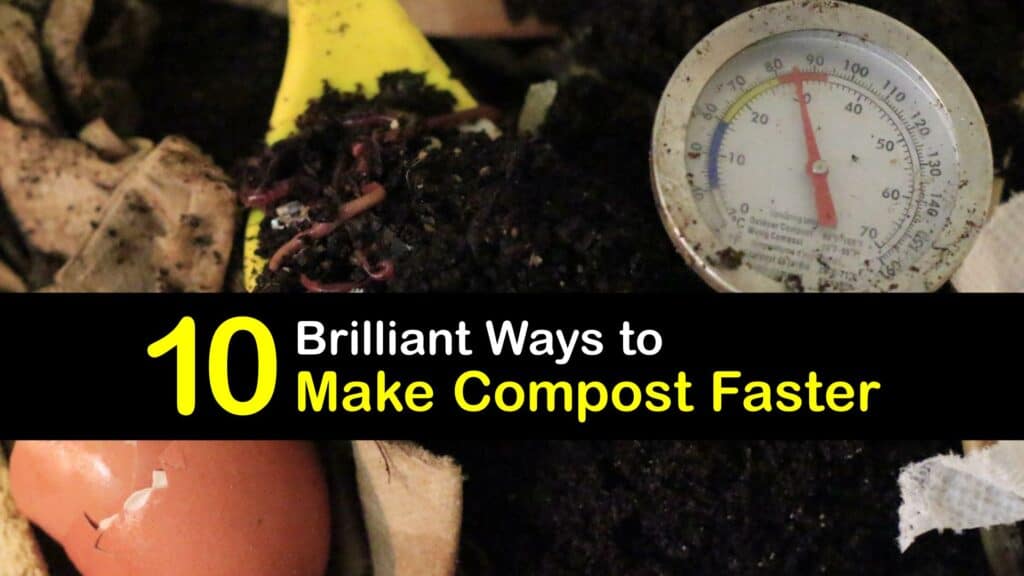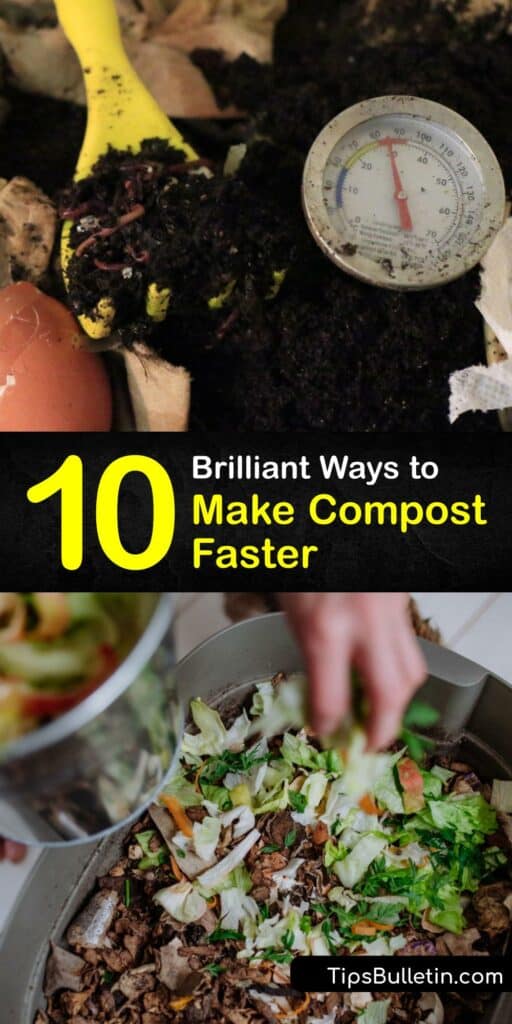Making compost is a fantastic way to turn food scraps and yard waste into a fertilizer for your lawn and garden. Unfortunately, composting may take a while, making you wait for usable compost. Learn how to make compost faster to shorten the waiting time.
Composting is nature’s way of recycling, and farmers often refer to the end product as black gold since the compost is high in nutrients plants love. However, it takes time for the organic material to decompose and turn into fertilizer. Additionally, the materials require the right amount of moisture, air, and heat to break down properly.
While a compost pile requires the proper conditions to turn from organic matter like grass clippings, dry leaves, and kitchen waste into a soil conditioner, there are ways to get faster results. Fast composting is easy and effective, and you benefit from using the compost material sooner than you think.

- Ways to Make Fast Compost
- The Advantages of Composting at Home
- Difference between Cold and Hot Composting
- Materials for Fast Composting
- Which Compost Materials Take the Longest to Decompose?
- The Best Way to Make Quick Compost
- How to Make Compost Faster
- The Importance of Adding Browns and Greens to the Compost
- What Not to Add to a Compost Heap
- How Long Does Composting Take?
- Ways to Use Finished Compost Around the Yard
Ways to Make Fast Compost
Discover the many advantages of composting at home, whether you are apartment composting or have a big pile in the backyard, and how to speed up the composting process. Discover how to quickly turn whole materials into garden fertilizer and tips for using the final product around the yard.
The Advantages of Composting at Home
There are various reasons to make your own compost pile. Homemade fertilizer is safer for the environment than chemical fertilizer, and composting is an excellent way to turn garden waste into plant food. What are some other benefits of home composting?
Composting kills weed seeds and encourages the production of beneficial fungi and bacteria that break down organic material into nutrient-rich fertilizers. The final product helps improve the soil and retain moisture, which is necessary for optimal plant growth. It prevents soil erosion, conserves water, reduces waste, and assists in stormwater management.
Difference between Cold and Hot Composting
Not all composts are the same; there is a big difference between cold and hot composting. Understand how cold and hot compost differ to help you pick the correct method for your needs.
Cold composting is a slow and low-maintenance approach using microorganisms that don’t require oxygen to live as they ferment organic waste.

Hot composting uses oxygen-needing microorganisms to create heat and quickly decompose waste material. This technique is the fastest, as long as the compost temperature is above 115°F.
Materials for Fast Composting
A wide range of green and brown materials is ideal for composting, but some take longer to decompose than others. Find out which materials are suitable for fast composting.
Cut or shred the organic material into smaller pieces, and try to get them to about half an inch before adding them to the compost pile. Add a compost starter or compost accelerator to give your compost a head start.
Start with a balance of brown and green material, and as the compost begins cooking, use 60% browns and 40% greens. Brown material consists of woody plant material, fallen leaves, sawdust, hay, shredded paper, and pine needles, while food waste and fresh grass clipping debris are green materials.
Which Compost Materials Take the Longest to Decompose?
Nothing slows composting faster than adding items that take a long time to decompose. Knowing which materials to avoid when fast composting is a good idea. To compost pine needles fast, be sure to stock your compost bin with a variety of brown and green materials.
Slow Composting Materials
All types of large greens and browns take longer to decompose; it’s essential to cut or shred them into small pieces before tossing them in the bin.
For example, while wood is excellent for composting, it’s high in lignin and takes longer to break down than grass clippings. Likewise, large pieces of cardboard decompose slower than shredded paper or straw.
The Best Way to Make Quick Compost
There is more than a single way to compost. Some prefer to prepare a compost heap, and others find that using a compost bin or tumbler meets their needs. Several popular methods are ideal for quick compost.
The compost heap, bin, and tumbler are three common ways to compost, and they each have pros and cons. A compost pile is precisely what it sounds like. It’s a heap of garden and kitchen scraps in an area of the yard – this is the messiest composting form.
A compost bin is a container that holds the compost material in place, and you use a pitchfork to turn the organic matter. A compost tumbler is a sealed unit that you rotate to mix the materials – this type is the easiest for creating fast compost.
How to Make Compost Faster
There are a few steps to take if you want to compost leaves quickly. Learn the importance of watering and turning your compost to keep the material moist and distribute heat to encourage microorganisms to break down the organic matter.
Watering is essential for aeration since oxygen travels through the water – never allow the compost to dry out or get too soggy. Compost that feels like a wrung-out sponge is just about right. Once the compost is moist, it’s important to turn and mix the pile every few days to aerate it, create air pockets, and distribute heat throughout the pile.
Use a compost thermometer to monitor and maintain a temperature of 130 to 160°F. If the heap is not hot enough, add insulation like straw or hay to increase the temperature and quicken the composting process.
The Importance of Adding Browns and Greens to the Compost
It’s vital to add the appropriate amount of greens and browns to your quick compost to ensure you get a positive outcome. Learn the difference between these materials and how they are essential to the compost pile.
Browns and Greens
Greens provide protein and nitrogen necessary for heating the compost pile for quick composting. In addition, they keep microbes well-balanced and help microorganisms multiply.
Browns are carbohydrate and carbon materials, and their main job is to feed the soil-dwelling organisms while adding bulk and airflow to the pile. Shredded paper in your compost is an example of brown material.
What Not to Add to a Compost Heap
While you may think that all leftover scraps are safe for composting, this isn’t true. Some items draw pests to the yard, and others contain chemicals that taint finished compost. Discover some common things to avoid adding to the composting bin.
It’s common to add manure to the compost, but do not place waste from pets or humans in the pile since they may cause a health risk. Cow manure is very good for compost, as is chicken, sheep, and horse dung.
While many food scraps are safe for composting, it’s best to avoid putting meat, dairy, grease, and oil into the heap, which attract vermin and makes the compost material stinky. Keep treated wood, sawdust, and weeds out of the pile to prevent chemical contamination.
How Long Does Composting Take?
The compost time frame varies depending on the method, and it’s considerably shorter for hot compost than for cold compost. Discover how long composting takes and how to tell when you have a finished product.
The easiest way to compost is through cold composting, but this process takes up to a year before you get the final product. Hot composting optimizes microbe activity and only takes three or more weeks, and worm bin composting takes one to three months.
Ways to Use Finished Compost Around the Yard
You followed all the proper composting measures and now have a bin of black gold waiting for the final step. Use compost around the yard to promote a lush lawn, productive garden, and beautiful plants.
The simplest way to utilize the benefits of compost is to spread it over the lawn or add it to native soil when you plant vegetables, trees, shrubs, and other plants.
Another way to use compost is to prepare compost tea and feed your plants with a soil drench or foliar spray. There is a long list of organic compost tea recipes from which to choose. If you enjoy container gardening, consider making a homemade potting mix with one part compost and three parts vermiculite.
Compost piles are great for turning organic waste into beneficial garden material, but there is a big difference between hot and cold composting and the time you have to wait for the result. While it takes some effort, hot compost is the best way to turn waste material into fertilizer quickly.

Now that you understand how to make compost faster and use the finished compost to promote healthy plant growth in the yard, why not share our quick composting guide with your friends and family on Facebook and Pinterest?